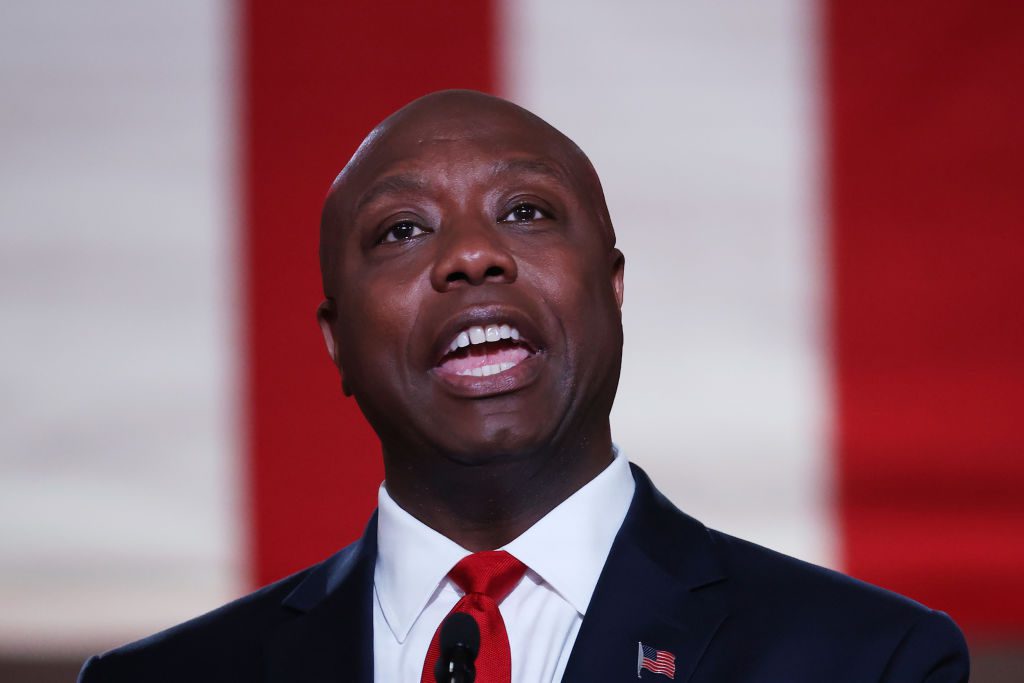The Good Tim Scott

Several years ago, I was at one of those absurd yet oddly addictive Conservative Inc. galas in Washington, the kind where everyone gets drunk on wine while an emcee rails against the lingering menace of Alger Hiss. I was standing in a group of people, off on a soliloquy that was no doubt far less insightful than I imagined, when I sensed someone come up beside me. It was a United States senator, Tim Scott of South Carolina. There was no entourage or fanfare; the man just came in. He then proceeded to stand there and listen attentively while I finished my point, before introducing himself and responding to what I had said.
That was the first of two times I’ve met Senator Scott. And while brief impressions can be misleading, I’ve always come away thinking he’s exactly who he appears on TV: decent, humble, guileless. If you’re a Machiavellian or a cynic, those aren’t necessarily the best qualities in a politician. But at a time of Obama administration condescension and Tea Party fury, they were refreshing to experience.
Last night, at the Republican National Convention, Scott gave the keynote address. And while its purpose was to endorse Donald Trump, the man it inadvertently spotlighted most was Tim Scott. He talked about growing up in an impoverished single-parent home and working his way to the United States Senate. He detailed the so-called Opportunity Zones that he’d worked on with President Trump, which use tax incentives to bring investment into underserved areas. He addressed poverty without leveraging it as grievance. He accused Joe Biden and Kamala Harris of wanting a cultural revolution. He discussed Biden’s cringeworthy comments on race and hypocrisy over criminal justice reform. He repeatedly used the O-word, “opportunity,” once a mainstay of Republican speeches.
It was an effective address, a bellwether for the convention’s necessary shift from “American carnage” and “lock her up” to a more optimistic offering, even while continuing to warn of the chaos in the streets. And it got me thinking. #NeverTrump types are forever in search of a Republican savior, a stovepipe-hatted paragon who can summon our better angels and clean up the GOP once Trump is gone. Their efforts are usually laughable (Mitt 2024! And then in 2032 too!). But why not Tim Scott? Admittedly he’s capable of changing a lightbulb without denouncing Trump, which seems to be a disqualifier at places like the Lincoln Project. But another Evan McMullin is never going to fly with a Republican base that’s firmly in formation behind the president. Scott certainly seems more capable of uniting the GOP’s disparate factions than, say, Nikki Haley.
As for the convention itself, I’ll have a longer recap on the proceedings this weekend. But I did want to draw attention to this hysterical analysis over at the New York Times. It will not surprise you to learn that the Times did not approve of night one at the RNC:
It was part of a vehement address [Donald Trump Jr.] delivered that framed the election as a choice between “church, work and school” and “rioting, looting and vandalism.”
The scorched-earth approach and knowing references to phrases like “cancel culture” would not have been out of place during a Fox News prime-time segment. By that measure, the arguments might help lure some wavering Republicans, uneasy with the president’s handling of the virus, back to Mr. Trump. But it was far from clear that the programming would appeal to any undecided voters.
Um…guys? The undecided electorate is not the same thing as the CUNY faculty retreat. Huge majorities think political correctness has gone too far. Violent crime is voters’ fifth biggest concern, according to Pew—compare that to racial and ethnic inequality, which came in eighth, and climate change, down at eleventh. To be sure, last night’s programming contained plenty of distortions, especially about the president’s record, and by all means those should be called out. But accepting political conventions for what they are, I think the Republicans are off to a good start.